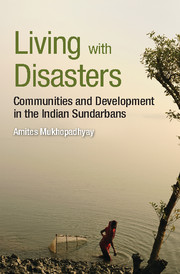Book contents
- Frontmatter
- Dedication
- Contents
- Maps and Illustrations
- Tables and Charts
- Glossary
- Acronyms
- Acknowledgements
- Note on Transliteration
- Maps
- Illustrations
- Charts
- 1 Introduction
- 2 From Wasteland to Wonderland: The Making of a Heritage Site
- 3 Governing the Sundarbans Embankments Today: Between Policies and Practices
- 4 Treading a Fine Path between River and Land: Livelihoods around Embankment
- 5 Beldars, Embankment and Governance: Question of Aboriginality Revisited
- 6 Catching Prawn, Endangering Embankments: Sustainability-Unsustainability Rhetoric
- 7 Conclusion
- Bibliography
- Index
5 - Beldars, Embankment and Governance: Question of Aboriginality Revisited
Published online by Cambridge University Press: 05 March 2016
- Frontmatter
- Dedication
- Contents
- Maps and Illustrations
- Tables and Charts
- Glossary
- Acronyms
- Acknowledgements
- Note on Transliteration
- Maps
- Illustrations
- Charts
- 1 Introduction
- 2 From Wasteland to Wonderland: The Making of a Heritage Site
- 3 Governing the Sundarbans Embankments Today: Between Policies and Practices
- 4 Treading a Fine Path between River and Land: Livelihoods around Embankment
- 5 Beldars, Embankment and Governance: Question of Aboriginality Revisited
- 6 Catching Prawn, Endangering Embankments: Sustainability-Unsustainability Rhetoric
- 7 Conclusion
- Bibliography
- Index
Summary
Biru Sardar and the tiger
In the Sundarbans, the so-called land of tides and tigers, people's livelihood revolves around the forest, water and narrow creeks. Stories of human encounters with tigers abound. After a day's work, when people meet at local tea or grocery shops on the islands, tiger stories often figure in their otherwise mundane conversations. The most interesting story that I heard during my fieldwork in Kusumpur was how an adivasi Sardar once killed a tiger. I heard the story for the first time as it was told by a few villagers, who happened also to be the workers of a local voluntary organization (Sangathan), when one evening they congregated at the tea stall next to the organization's office. The workers were sharing tiger stories amongst themselves: stories of tigers killing people and instances when people escaped death at the fangs of the tiger. Suddenly Ratan, a worker of the Sangathan, said, ‘But nothing beats the story of Biru Sardar’. ‘There you are’, everyone present in the stall instantaneously agreed with him. Turning to me, Prafulla, another worker of the Sangathan, said, ‘You might like to hear this story, as you seemed interested in knowing about the adivasis in Sardarpara [locality where Sardars live]’. Then Prafulla and the others asked Ratan to narrate the story. Ratan happened to be the first narrator but later I heard the same story from other villagers who had all heard it from their fathers and grandfathers. According to the villagers, the incident happened when Kusumpur had already become inhabited. The story goes like this:
Once, on a warm and sultry night, Biru Sardar, an aged tribal of Sardarpara, was sleeping outside his house. Because of mosquitoes, he had covered himself with a sheet. Biru was in deep sleep when a tiger appeared. As he was fully covered, the tiger could not make out if it was a human being, but continued towards him. Meanwhile Biru's sleep had been broken by the smell of the tiger, but he pretended to be still asleep. The tiger came near Biru and, in an attempt to know what it was, finally had him between its four legs. Realizing that he was lying under the tiger, Biru, in a state of shock, suddenly embraced the tiger, held it hard against him and shouted, “Tiger”, “tiger”. […]
- Type
- Chapter
- Information
- Living with DisastersCommunities and Development in the Indian Sundarbans, pp. 94 - 116Publisher: Cambridge University PressPrint publication year: 2016



